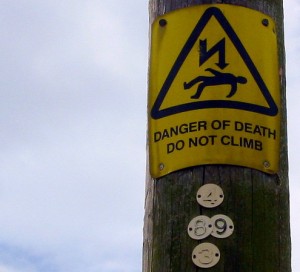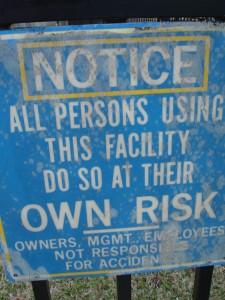Don’t you wish you had riskier projects? (Part 3)
 On Wednesday, I told you all how wonderful risk is. Yesterday, I talked about the two different types of risk a project can face, and why a business should be happy to embrace one of them. But should project managers be happy about this type of risk?
On Wednesday, I told you all how wonderful risk is. Yesterday, I talked about the two different types of risk a project can face, and why a business should be happy to embrace one of them. But should project managers be happy about this type of risk?
Well… it depends. As I said yesterday, the competency type of risk, that involved with making sure you and others have done their job, should be ruthlessly fought. But the other type of risk, the business risk that any project will face, needs to be balanced against the possible rewards.
For a business, this is simple, even if it isn’t easy. You look at the likely rewards if the project is successful, the cost of doing the project, and the chance of the project being successful or, in other words, the riskiness of it. Then, you use a simple calculation to get the expected value – multiply the likely rewards by the probability of success, and if the answer is greater than the cost of the project, go out and do it!
That’s all well and good for the overall business, but what about you, one project manager inside it? This is where it becomes more complicated. And it becomes more complicated because people are much more complex than a business.
As a project manager, you are naturally going to want your project to be a success. But the reasons for wanting the project to be a success are a lot more complicated than the reason a business wants the project to be a success.
A business gets (usually) a clear and obvious financial reward from a successful project. A certain amount of money goes into running the project, and at the end of it, hopefully a larger amount of money comes out as a result. This is pretty much the only concern of the business.
For a project manager, though, it goes beyond that. Yes, you will want to deliver value, and profit, for the business. But you will have other reasons for wanting the project to be a success.
You will want the people on the project to do well in their careers, and a successful project helps that. You will want to do well in your own career! You will have an emotional attachment to the project. There are many reasons why you want the project to be a success.
But there is another side to a project manager’s connection to the project. Yes, we will want it to be a success. But we will also fear it being a failure. And fear of failure can be a very dangerous thing.
We fear having a failed project on our record. We fear a history of failure could hold us back in the future. We fear a loss of prestige. And, worst of all, we fear losing our jobs due to a project failure.
The problem is that we, as people, rather than project managers, have to deal with two risks. There are the project risks, and there are the personal risks. We know how to deal with the project risks, how to evaluate them, mitigate them, remove them, or accept them. But personal risks are a lot more complicated, a lot more difficult for us to deal with.
Let’s face it, no matter how confident we are, the personal costs of a failed project can seem huge. When we fear for our jobs or our future careers if a project fails, is it any wonder we shy away from risky projects? Even if we did the same evaluation as a business, the project manager personally seems to have so much to lose from a failure, and relatively little to gain from a success.
And that makes it rational for us to stay away from risky projects – even though they may be of great benefit to the business!
Now, this is a problem which has to be tackled by the business. After all, they have the most to gain from running riskier projects. So what can be done?
Well, as we’ve seen, the risk versus reward needs to be rebalanced. The project manager fears losing so much, but gains so little from a successful project. This leaves two obvious solutions.
The first one is to greatly increase the possible rewards. Offer huge bonuses, promote a successful project manager, give him or her a share of all the profits.
On the whole, I suspect businesses are unlikely to go this route.
The second one is to greatly reduce the possible losses. Now, this has, I think, more mileage in it. There are simple and inexpensive ways for a business to do this. Here are five examples:
- Don’t just praise success – praise failure. We learn more from failure than success. If the project team has done their job well, but didn’t quite make it, praise them for their efforts.
- Stop saying a project has failed when it hasn’t. If the project team did their job well, but the project still didn’t give the hoped-for result, then praise the project team. The project team can control the output of a project – what is actually produced – but they can’t control the outcome – how that output is received. In other words, if they created the new product that everyone thought the market wanted, but it didn’t sell, they still did their job!
- Stop pointing the finger. Given we know there are risks we can’t control, the business risks that can’t be got rid of, businesses, and the people in them, should stop working so hard to assign blame. Not everything is someone’s fault. Quite often, bad things happen without anyone causing it. Accept it.
- Support project managers. Accept that some things are outside of the control of even the best project managers. If the project has shown areas they are weak in, help them get better. Stop using the result of one complicated, difficult and unique project to predict how the project manager will do in another complicated, difficult and unique project.
- Judge a project manager by project management success, not the project success. Be fair, and only evaluate a project manager based on what is actually in their control.
By taking these and other steps, by working hard to change the culture of the business, they can change the personal risk versus reward calculation for a project manager. Reduce those risks, and get good project managers excited about doing risky projects.
Because risky projects worth doing offer the best reward for businesses, and, in my experience, are a lot more fun to work on for project managers. So, I ask again the question that started all this, I ask it both of project managers and of businesses that run projects – don’t you wish you had riskier projects?
(Image courtesy of afanc. Some rights reserved.)

